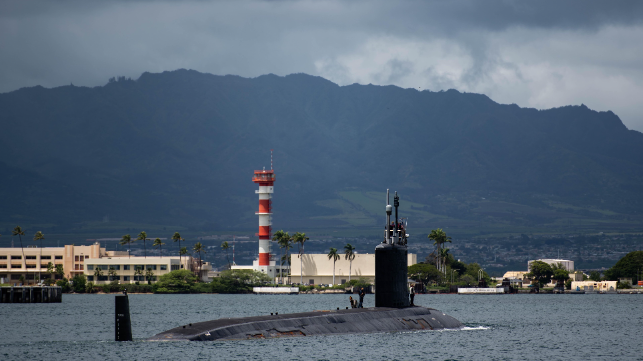U.S. Bolsters S. China Sea Presence as Tensions Rise at Whitsun Reef

Tensions over the Chinese maritime militia presence at Philippine-claimed Whitsun Reef are rapidly heating up. Over the course of the past week, Philippine and Chinese diplomats have traded barbed words about China's intentions in the region, and the U.S. has signaled the deployment of additional assets to bolster the U.S. Navy's presence in the South China Sea.
Beijing insists that the Chinese trawlers at Whitsun Reef are nothing more than fishing vessels, and that they have anchored in the area due to bad weather.
The weather in the area has been calm, and Western defense analysts have identified at least some of the idle vessels as purpose-built maritime militia trawlers. And unlike typical Chinese fishing vessels, these well-kept trawlers have not been engaged in fishing.
"The Chinese ambassador has a lot of explaining to do. As of our latest maritime and aerial surveillance, there are still 44 Chinese vessels that are in Julian Felipe Reef," Lorenzana said in a statement. "I am no fool. The weather has been good so far, so they have no other reason to stay there. These vessels should be on their way out. Umalis na kayo diyan [Leave now]."
China's embassy in Manila immediately pushed back on Lorenzana's remarks. In a statement issued Saturday, an embassy spokesman said that "[we have] taken note of the perplexing statement by Philippine Defense Secretary," and that "we hope that authorities concerned would make constructive efforts and avoid any unprofessional remarks which may further fan irrational emotions."
"The utter disregard by the Chinese Embassy in Manila of international law especially the UNCLOS to which China is a party is appalling," Lorenzana fired back Sunday.
In a reversal for Manila's efforts to cultivate ties with Beijing, the Philippines is now said to be considering expelling the Chinese embassy's spokesman. "Normally, this is part of the range of diplomatic courses of actions, but I have no confirmation yet,” Foreign Affairs Executive Director Ivy Banzon-Abalos told The Sydney Herald.
The Global Times, a prominent Chinese government-owned outlet, warned the Philippine government to avoid escalation. "[The Philippine military] should not act rashly other than making some noise," said Global Times editor Hu Xijin. "Otherwise, China will definitely give a strong response."
U.S. bolsters naval presence
The United States, which has a defense treaty relationship with the Philippines, has dispatched the amphib USS Makin Island and her escorts to the South China Sea, according to the Beijing-based South China Sea Strategic Situation Probing Initiative. The carrier USS Theodore Roosevelt is also operating in the region, conducting exercises with the Malaysian air force, according to Indo-Pacific Command.
On Thursday, Pacific Fleet also announced that the Virginia-class attack sub USS Illinois has put to sea for a deployment to the Indo-Pacific. The signaling is rare, as the movements of the "silent service" are not typically announced.
"An armed attack against the Philippines’ armed forces, public vessels or aircraft in the Pacific, including in the South China Sea, will trigger our obligations under the US-Philippines Mutual Defense Treaty," said U.S. State Department spokesman Ned Price on Wednesday. "We will always stand by our allies and stand up for the rules-based international order."
Indo-Pacific Command also announced that the USS John S. McCain has made another transit of the Taiwan Strait - an operation used to show U.S. support for Taiwan's continued autonomy. China typically objects to these patrols.
"The U.S. warship's action sends the wrong signal to 'Taiwan independence' forces; it deliberately interferes in regional affairs and harms peace and stability in the Taiwan Strait," said PLA spokesman Zhang Chunhui.
